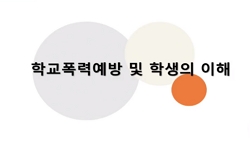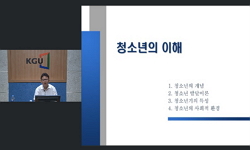본 연구는 부모-자녀 의사소통 유형과 청소년 정서상태가 청소년의 문제행동 유형에 미치는 영향을 살펴보고, 청소년 문제행동에 대한 효과적인 개입 방안을 모색하기 위한 기초 자료를 제...
http://chineseinput.net/에서 pinyin(병음)방식으로 중국어를 변환할 수 있습니다.
변환된 중국어를 복사하여 사용하시면 됩니다.
- 中文 을 입력하시려면 zhongwen을 입력하시고 space를누르시면됩니다.
- 北京 을 입력하시려면 beijing을 입력하시고 space를 누르시면 됩니다.
부모-자녀 의사소통 유형 및 정서상태와 청소년 문제행동간의 관계 연구 = (A) Study on the Relationship of Parent-Adolescent Communication, Emotionand Adolescents' Problem Behaviors
한글로보기https://www.riss.kr/link?id=T10505097
- 저자
-
발행사항
서울 : 서울여자대학교 특수치료전문대학원, 2005
-
학위논문사항
학위논문(석사) -- 서울여자대학교 특수치료전문대학원 , 특수심리치료학과 , 2006. 2
-
발행연도
2005
-
작성언어
한국어
- 주제어
-
KDC
186.5 판사항(4)
-
DDC
158 판사항(21)
-
발행국(도시)
서울
-
형태사항
vi, 74p. ; 26cm
-
일반주기명
참고문헌: p. 56-63
-
소장기관
-
0
상세조회 -
0
다운로드
부가정보
국문 초록 (Abstract)
본 연구의 연구문제는 다음과 같다.
첫째, 부모-자녀 의사소통 유형과 청소년의 문제행동 은 어떠한 관계를 보이는가?
둘째, 정서상태와 청소년 문제행동은 어떠한 관계를 보이는가?
셋째, 부모-자녀 의사소통 유형과 정서상태는 어떠한 관계를 보이는가?
넷째, 성별에 따른 부모-자녀 의사소통유형과 정서 상태는 청소년 문제행동과 어떠한 관계를 보이는가?
본 연구는 경기도에 소재한 인문계 고등학교 1, 2학년 남, 여학생 650명을 대상으로 하였다. 자료처리는 SPSS WIN 12.0 프로그램을 사용하여 t-test, 상관관계분석, 다중회귀분석을 실시하였다.
본 연구의 결과는 다음과 같다.
첫째, 청소년 문제행동과 부모와의 의사소통의 관계에서, 부모와의 역기능적인 의사소통이 청소년 문제행동에 많은 영향을 미치고 있었으며, 특히 권위 반항형 문제행동에는 모와의 역기능적인 의사소통이, 폭력/절도형 문제행동에는 부, 모와의 역기능적인 의사소통이 많은 영향을 미치는 것으로 나타났다.
둘째, 정서상태와 청소년 문제행동의 관계에서, 분노는 모든 유형의 문제행동에 매우 많은 영항을 미치는 것으로 나타났고, 우울은 폭력/절도형 문제행동에 부적인 영향을 미치는 것으로 나타났다.
셋째, 부모-자녀 의사소통 유형과 정서상태의 관계에서, 부모와의 역기능적인 의사소통은 우울과 분노에 많은 영향을 미쳤는데, 특히 여학생의 우울과 분노가 부모와의 역기능적인 의사소통의 영향을 많이 받는 것으로 나타났다. 또한 여학생의 분노는 부와의 역기능적인 의사소통에 영향을 받았고, 남학생의 분노는 모와의 역기능적인 의사소통에 영향을 받았다.
넷째, 부모-자녀 의사소통 유형과 정서상태 두 가지 변인이 청소년 문제행동에 미치는 영향을 보았을 때, 가장 영향을 많이 미치는 것은 분노였으며, 그 다음으로는 모와의 역기능적인 의사소통이었다. 유흥/풍속형 문제행동이나 도피형 문제행동에서는 부모와의 의사소통의 영향력이 나타나지 않았으나, 권위 반항형 문제행동과 폭력/절도형 문제행동에서는 부모와의 역기능적인 의사소통이 영향을 미치는 것으로 나타났다.
결론적으로 청소년 문제행동에 대한 부모-자녀 의사소통과 정서상태의 관련성에서 부모와의 역기능적인 의사소통이 문제행동에 직접적, 간접적으로 영향을 미치며, 특히 청소년의 권위 반항형 문제행동과 폭력/절도형 문제행동이 부모와의 역기능적 의사소통에 더 많은 영향을 받는다는 것을 알 수 있었다. 또한 분노는 청소년의 문제행동 모든 유형에 가장 큰 영향을 미치는 변인으로 나타나, 청소년의 문제행동에 대한 개입 방안에서 청소년의 분노를 다루어 주는 것이 매우 중요하다는 것을 알 수 있었다.
본 연구에서는 청소년의 문제행동을 유형별로 나누어, 각각의 유형에 대한 부모-자녀 의사소통과 정서상태의 영향력을 살펴보았으므로, 청소년의 문제행동에 대한 더욱 구체적인 이해와 상세한 개입 방안을 모색하는데 도움이 될 수 있을 것으로 기대한다.
본 연구는 부모-자녀 의사소통 유형과 청소년 정서상태가 청소년의 문제행동 유형에 미치는 영향을 살펴보고, 청소년 문제행동에 대한 효과적인 개입 방안을 모색하기 위한 기초 자료를 제공하고자 하였다.
본 연구의 연구문제는 다음과 같다.
첫째, 부모-자녀 의사소통 유형과 청소년의 문제행동 은 어떠한 관계를 보이는가?
둘째, 정서상태와 청소년 문제행동은 어떠한 관계를 보이는가?
셋째, 부모-자녀 의사소통 유형과 정서상태는 어떠한 관계를 보이는가?
넷째, 성별에 따른 부모-자녀 의사소통유형과 정서 상태는 청소년 문제행동과 어떠한 관계를 보이는가?
본 연구는 경기도에 소재한 인문계 고등학교 1, 2학년 남, 여학생 650명을 대상으로 하였다. 자료처리는 SPSS WIN 12.0 프로그램을 사용하여 t-test, 상관관계분석, 다중회귀분석을 실시하였다.
본 연구의 결과는 다음과 같다.
첫째, 청소년 문제행동과 부모와의 의사소통의 관계에서, 부모와의 역기능적인 의사소통이 청소년 문제행동에 많은 영향을 미치고 있었으며, 특히 권위 반항형 문제행동에는 모와의 역기능적인 의사소통이, 폭력/절도형 문제행동에는 부, 모와의 역기능적인 의사소통이 많은 영향을 미치는 것으로 나타났다.
둘째, 정서상태와 청소년 문제행동의 관계에서, 분노는 모든 유형의 문제행동에 매우 많은 영항을 미치는 것으로 나타났고, 우울은 폭력/절도형 문제행동에 부적인 영향을 미치는 것으로 나타났다.
셋째, 부모-자녀 의사소통 유형과 정서상태의 관계에서, 부모와의 역기능적인 의사소통은 우울과 분노에 많은 영향을 미쳤는데, 특히 여학생의 우울과 분노가 부모와의 역기능적인 의사소통의 영향을 많이 받는 것으로 나타났다. 또한 여학생의 분노는 부와의 역기능적인 의사소통에 영향을 받았고, 남학생의 분노는 모와의 역기능적인 의사소통에 영향을 받았다.
넷째, 부모-자녀 의사소통 유형과 정서상태 두 가지 변인이 청소년 문제행동에 미치는 영향을 보았을 때, 가장 영향을 많이 미치는 것은 분노였으며, 그 다음으로는 모와의 역기능적인 의사소통이었다. 유흥/풍속형 문제행동이나 도피형 문제행동에서는 부모와의 의사소통의 영향력이 나타나지 않았으나, 권위 반항형 문제행동과 폭력/절도형 문제행동에서는 부모와의 역기능적인 의사소통이 영향을 미치는 것으로 나타났다.
결론적으로 청소년 문제행동에 대한 부모-자녀 의사소통과 정서상태의 관련성에서 부모와의 역기능적인 의사소통이 문제행동에 직접적, 간접적으로 영향을 미치며, 특히 청소년의 권위 반항형 문제행동과 폭력/절도형 문제행동이 부모와의 역기능적 의사소통에 더 많은 영향을 받는다는 것을 알 수 있었다. 또한 분노는 청소년의 문제행동 모든 유형에 가장 큰 영향을 미치는 변인으로 나타나, 청소년의 문제행동에 대한 개입 방안에서 청소년의 분노를 다루어 주는 것이 매우 중요하다는 것을 알 수 있었다.
본 연구에서는 청소년의 문제행동을 유형별로 나누어, 각각의 유형에 대한 부모-자녀 의사소통과 정서상태의 영향력을 살펴보았으므로, 청소년의 문제행동에 대한 더욱 구체적인 이해와 상세한 개입 방안을 모색하는데 도움이 될 수 있을 것으로 기대한다.
다국어 초록 (Multilingual Abstract)
Parent-adolescent communication was consisted of 2 factors, open communication style and dysfunctional communication style. Adolescents' problem behaviors were divided into 4 groups; moral problem such as smoking or drinking alcohol, authority resistance problem such as resistance to parent or teacher, violence problem, escape problem such as suicide, use of drug.
Data of this study were collected from 650 high school students residing in Gyeong-gi area by using self-check questionnaire method.
The major results of this study were as follows;
First, there were significant effects of the parent-adolescent dysfunctional communication on the problem behaviors. Especially the adolescents who had more dysfunctional communication with mother showed more moral problems and who had more dysfunctional communication with father showed more violence problems.
Second, there were significant effects of depression and anger on the problem behaviors. Especially the anger influenced positively on all groups of adolescents' problem behaviors very strongly and the depression influenced negatively on the violence problem.
Third, the adolescents who had more dysfunctional communication with parent showed more anger and depression, and female students were influenced more.
Finally, there were significant effects of the parent-adolescent communication, depression and anger on adolescents' problem behaviors. The most influential variable was the anger, and followed by the dysfunctional communication with mother.
The Purpose of this study was to investigate the relationship of the adolescents' problem behaviors with parent-adolescent communication, depression and anger, and to analyze the relative significance of variables influencing on each group of adolesce...
The Purpose of this study was to investigate the relationship of the adolescents' problem behaviors with parent-adolescent communication, depression and anger, and to analyze the relative significance of variables influencing on each group of adolescents' problem behaviors.
Parent-adolescent communication was consisted of 2 factors, open communication style and dysfunctional communication style. Adolescents' problem behaviors were divided into 4 groups; moral problem such as smoking or drinking alcohol, authority resistance problem such as resistance to parent or teacher, violence problem, escape problem such as suicide, use of drug.
Data of this study were collected from 650 high school students residing in Gyeong-gi area by using self-check questionnaire method.
The major results of this study were as follows;
First, there were significant effects of the parent-adolescent dysfunctional communication on the problem behaviors. Especially the adolescents who had more dysfunctional communication with mother showed more moral problems and who had more dysfunctional communication with father showed more violence problems.
Second, there were significant effects of depression and anger on the problem behaviors. Especially the anger influenced positively on all groups of adolescents' problem behaviors very strongly and the depression influenced negatively on the violence problem.
Third, the adolescents who had more dysfunctional communication with parent showed more anger and depression, and female students were influenced more.
Finally, there were significant effects of the parent-adolescent communication, depression and anger on adolescents' problem behaviors. The most influential variable was the anger, and followed by the dysfunctional communication with mother.
목차 (Table of Contents)
- 논문개요 = ⅰ
- 목차 = ⅲ
- Ⅰ. 서론 = 1
- 1. 연구의 필요성 및 목적 = 1
- 2. 연구 문제 = 6
- 논문개요 = ⅰ
- 목차 = ⅲ
- Ⅰ. 서론 = 1
- 1. 연구의 필요성 및 목적 = 1
- 2. 연구 문제 = 6
- Ⅱ. 이론적 배경 = 7
- 1. 청소년 문제행동 = 7
- 1) 청소년 문제행동의 개념 및 유형 = 7
- 2) 청소년 문제행동의 유형별 현황 = 11
- 3) 청소년 문제행동의 원인 = 12
- 2. 부모-자녀 의사소통과 청소년 문제행동 = 14
- 1) 부모-자녀 의사소통 = 14
- 2) 부모-자녀 의사소통과 청소년 문제행동 = 16
- 3. 청소년의 정서상태와 문제행동 = 18
- 1) 청소년기의 정서 상태 = 19
- 2) 청소년의 정서상태와 문제행동 = 21
- Ⅲ. 연구 방법 = 26
- 1. 연구대상 = 26
- 2. 연구도구 = 26
- 1) 부모-자녀 의사소통 = 26
- 2) 정서상태 = 28
- 3) 청소년 문제행동 = 29
- 3. 자료 처리 및 분석 = 30
- Ⅳ. 연구결과 및 해석 = 31
- Ⅴ. 논의 및 결론 = 48
- 1. 논의 = 48
- 2. 결론 = 52
- 참고문헌 = 56
- 부록 = 64
- ABSTRACT = 73











